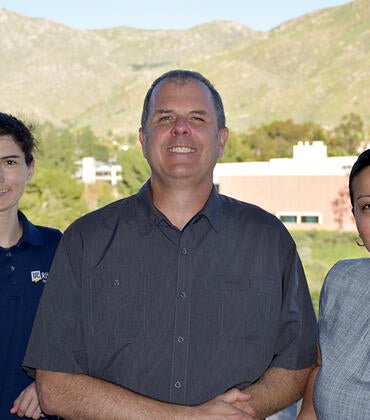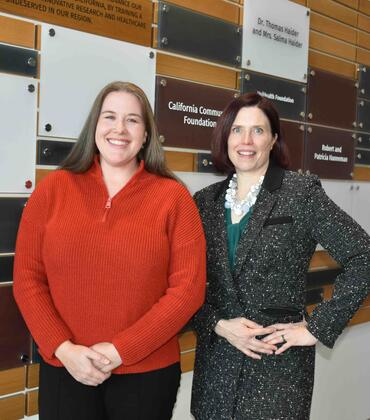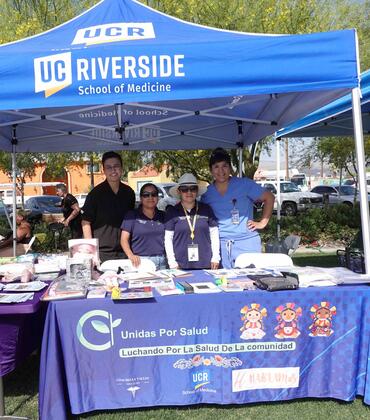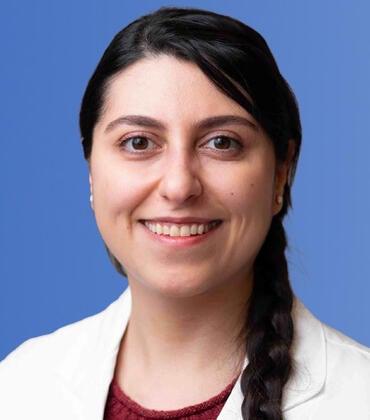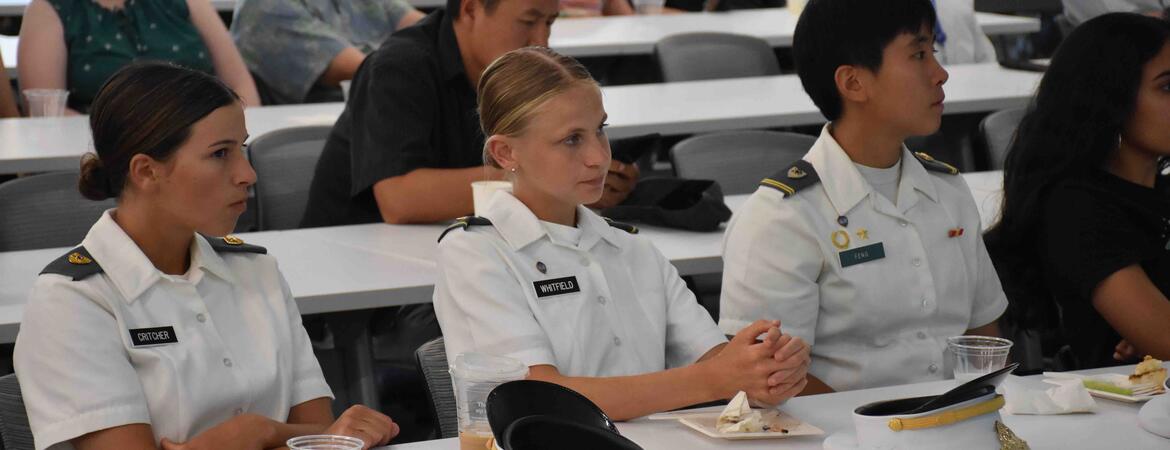
The first time Madison Critcher, a cadet at the United States Military Academy (West Point), made gels to visualize proteins in a UC Riverside lab, they didn’t work. But to her surprise, no one was upset. “We just learned how to do it and tried again, and were much more successful the second time,” the rising sophomore recalled. “It taught me a lot about how research is not always going to be a winning process…and to take every part of the process and learning experience and not get discouraged.”
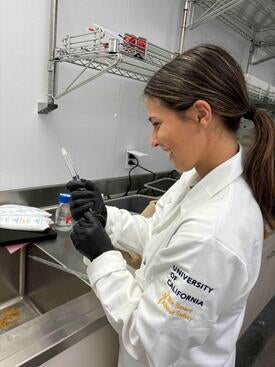
The experience was part of a new summer internship program between the UC Riverside School of Medicine and West Point that aims to further connections between the two schools, from giving cadets new research opportunities to pushing research opportunities that may aid the U.S. military or service members.
Critcher spent her four-week internship in the lab of Scott Pegan, PhD, a professor of biomedical sciences and Army lieutenant colonel who helped create the program. “This connection between the School of Medicine and United States Military Academy aims to foster research collaborations and cultural exchanges that enables SOM to aid the nation in key areas that safeguard the health of these often-underrepresented populations in medicine,” said Pegan. “These opportunities lead to cadets making tangible contributions to scientific exploration reflected in scientific literature as a manner to help prepare them for the role of physician.”
With the significant veteran population in Riverside, Pegan added, “The three cadets’ visit is the latest facet of the School of Medicine’s efforts to reach out to the veteran and service-connected populations in our community and beyond.”
Like Pegan, Critcher emphasized the importance of building ties between the schools while drawing on their combined resources to further cadets’ education. As the first person in her immediate family to pursue either a medical doctor or military path, Critcher said her goal is to help as many people as possible. “I've always felt a certain call to service,” Critcher explained. “I believe that one specific way I can [serve people] is by dedicating my time and helping people get access to medical care, or providing that medical care myself.”
At UCR, Critcher said she hoped to learn skills to take back to West Point. Her work in Pegan’s lab contributed to a project examining the Crimean-Congo hemorrhagic fever virus to work toward future vaccines and treatments. “I'm learning about the mechanisms behind the virus, and I'm learning techniques for preparing the protein to be studied and basically to be turned into a crystal and photographed,” she said. “A lot of the techniques in virology that Lieutenant Colonel Pegan and his lab group are teaching me here I hope to apply at West Point, which goes to help me in securing additional grants…and help me write my own research papers in the future.”
The internship experience, Critcher continued, went better than she expected. “Everyone in the lab group has really made a strong effort to get me doing hands-on work, giving me autonomy within the lab, and teaching me all that they know, which has been truly wonderful,” she said. Critcher added that there’s never a shortage of things to work on. “I feel like Riverside has given us a lot to do within a short amount of time, which is great. I think that's a good push for us to get as much out of this experience as we possibly can,” she said.
Tying medical research to the military
Critcher’s two fellow cadets in the inaugural program, Audrey Whitfield and Xinyi Sherry Feng, worked in the labs of David Lo, MD, PhD, distinguished professor of biomedical sciences and director of UCR’s BREATHE Center, and Erica Heinrich, PhD, assistant professor of biomedical sciences, respectively.
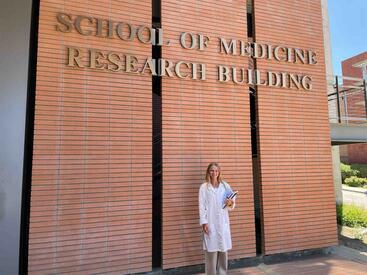
Like Critcher, Whitfield had memorable experiences during her internship. On her second day at UCR, she observed a mouse necropsy in Lo’s lab. While she’d seen dissections in high school and as the daughter of a biology and anatomy teacher, Whitfield said this was her first time seeing tissue being taken for study. “In high school, we just dissected to look at the parts and we didn't end up doing anything with it,” she explained. “It’s really cool to see how it can keep going down steps further.”
The rising sophomore came to the UCR program for focused research time and has been contributing to Lo’s Salton Sea project, which examines the environment’s influence on people’s health in the region. “I think it's really important to tie medical research into the military because medical research is always changing, and everyone's always learning something new or making a new discovery,” Whitfield said. In the military, “it’s really important that those casualties and those injuries are getting treated with the most advanced medical knowledge that we have.”
Her mentor, Lo, agreed. “A closer connection with the Army will also help us identify the research needs to help understand health related needs of military personnel,” he said. “This is a chance to build stronger ties to the program at USMA West Point, and the research collaborations will also help us in service to the armed forces.”
At the end of her four weeks at UCR, Whitfield encouraged other cadets to participate in the program. “All the professors and students I’ve spoken to just do a really good job of being very welcoming, and they're always willing to help,” she said. “Everything I've experienced so far has just made me a better person and made me want to continue this as a career in the future.”
Gaining medical school experience
The third cadet, Xinyi Sherry Feng, also focused on research to serve soldiers and the community. Dedicated from a young age to becoming a “hero,” the rising junior said experiencing the medical school environment has given her more insights into becoming a doctor. In particular, she’s worked closely with current SOM student Carlos Rubio on hypoxia and the immune system in Heinrich’s lab.
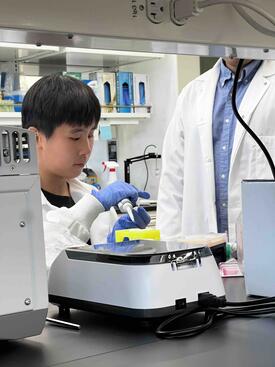
Rubio introduced her to various aspects of medical school, including visiting the SOM’s Center for Simulated Patient Care to get hands-on experience practicing lumbar punctures. “Carlos also showed me and the other two cadets here how to do ultrasounds on the neck and then also in the eye, which I didn't know was possible,” Feng said.
And as a former service member and [army medic], Rubio understood her background. “He can tell me a lot about what it's like to be on the track of being an army doctor,” Feng said.
Feng’s first week at UCR already strengthened her future goals. “Seeing all the procedures, all the technical things that go into being a doctor, that just solidified my interest in being a doctor,” she said.
Feng is now considering applying to UCR as she discovered that the school’s mission aligns with her own. Attending the biomedical sciences 50th anniversary kickoff event, Feng learned about the SOM’s mission to serve the community. “I thought that correlated with what West Point is doing too, to serve the people and the community,” she said. “So I thought…their mission aligns with a lot of other things that I believe in, so I think that's one of the reasons I want to also apply here too.”
“I think being a doctor is not just being a doctor—you have to be well-rounded as a person,” Feng added. “I think research, being in the military, all those experiences will make me a better doctor compared to people who haven't got those experiences.”
This is, in fact, another goal of the program. “The cadets really get to learn from these medical students about what that experience is like, all the way from how do I apply and be a good candidate to what is medical school like,” said Heinrich, Feng’s mentor. “All three of them want to go to medical school, so I'm just really glad that we've been able to help them visualize that path and also get these unique research experiences.”
Building future ties between the schools
One of the ultimate goals of the program as it continues is longitudinal research. Halfway through her internship, Critcher expressed excitement about returning for another summer. “I would be very much interested in coming back and building on what I've learned so far,” she said, adding that she hopes to gain more experience with crystallography and photographing protein models. “I think that would be something where I wouldn't necessarily have access to the technology at West Point, so if I were able to learn some of the techniques here, it would be really cool.”
Like the other cadets, Critcher encouraged her West Point classmates to participate in the internship. “I feel like it's really, really great for cadets to be coming out here and starting to make those connections as an exchange of information and resources in order to develop stronger connections,” she said. “No matter what, you're going to learn something throughout this program.”
